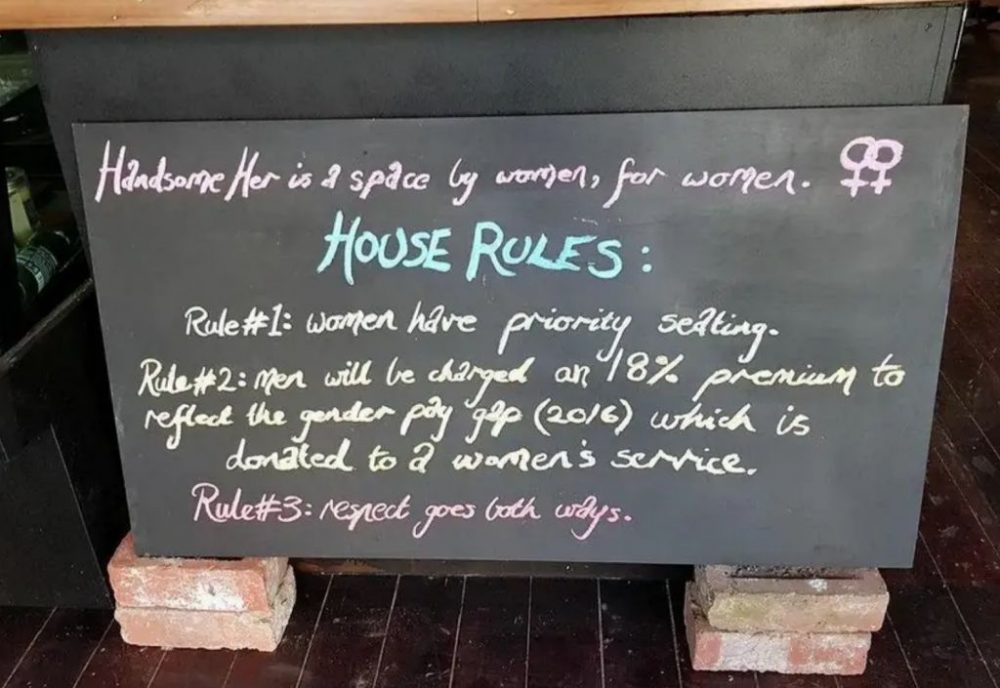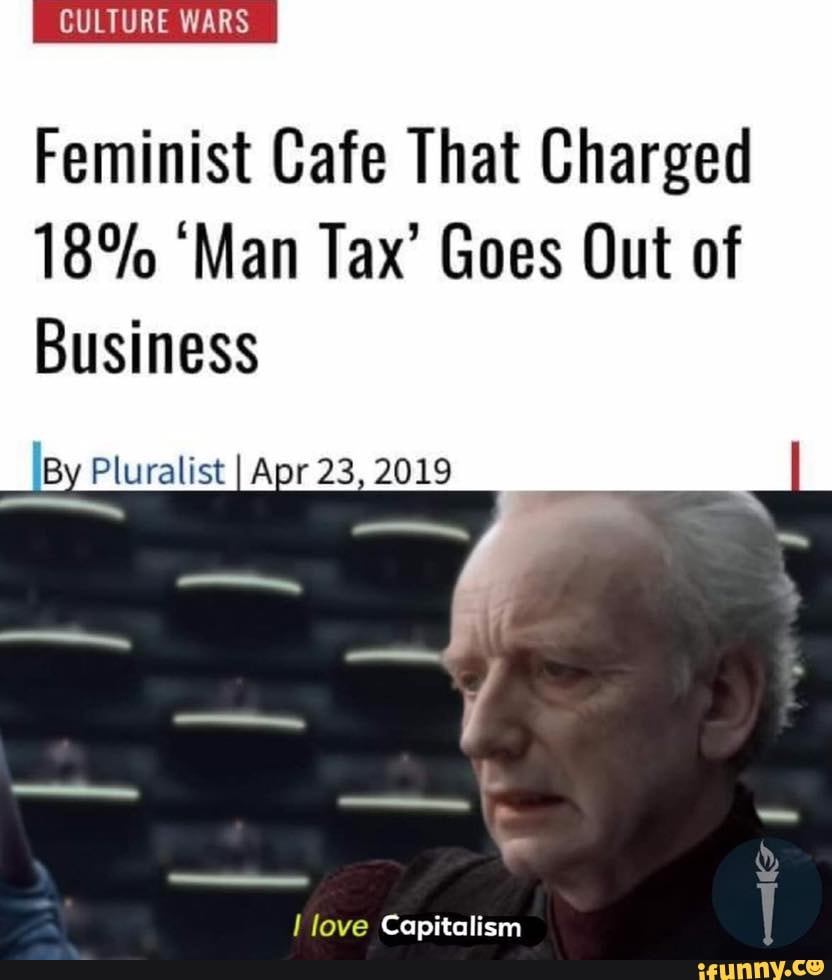Feminist Cafe Man Tax: Understanding The Debate And Its Impact
The term "feminist cafe man tax" has sparked heated discussions worldwide, raising questions about gender equality, societal norms, and the role of businesses in promoting progressive values. In recent years, feminist cafes have emerged as a unique space for women to connect, share ideas, and celebrate their identities. However, the concept of charging men more than women for services at these cafes has ignited debates on fairness and discrimination. This article explores the origins, implications, and controversies surrounding this phenomenon.
As society continues to evolve, the conversation around gender equality has expanded into various sectors, including the hospitality industry. Feminist cafes, with their mission to empower women and challenge traditional gender roles, have become a focal point for discussions about equity and justice. The "man tax," a pricing strategy where men are charged more than women for the same services, raises important questions about fairness and the effectiveness of such measures in promoting equality.
While some argue that the feminist cafe man tax is a necessary step toward addressing systemic inequalities, others view it as a form of reverse discrimination. Understanding both sides of the debate requires delving into the history of feminist movements, the role of cafes as social spaces, and the ethical considerations of implementing such pricing strategies. This article aims to provide a comprehensive overview of the topic, equipping readers with the knowledge to form informed opinions.
Table of Contents
- What is Feminist Cafe Man Tax?
- History of Feminist Cafes
- Man Tax Pricing Strategy
- Gender Equality in the Hospitality Industry
- Legal Implications of Man Tax
- Ethical Considerations
- Consumer Reactions
- Case Studies
- The Future of Feminist Cafes
- Conclusion
What is Feminist Cafe Man Tax?
The feminist cafe man tax refers to a pricing strategy implemented by some cafes that identify as feminist. These establishments charge men a higher price than women for the same products or services. The practice is intended to highlight and address gender-based economic disparities, where women often earn less than men in various industries. By charging men more, these cafes aim to provoke discussions about wage gaps, systemic inequalities, and the need for gender parity.
How Does the Man Tax Work?
In practical terms, the man tax can take different forms. Some cafes might charge a fixed percentage more for male customers, while others may offer discounts exclusively to women. For example, a coffee priced at $5 for women might cost $6 or $7 for men. The exact pricing structure varies depending on the cafe's philosophy and target audience. While the concept is straightforward, its implementation has sparked a wide range of reactions from both supporters and critics.
Key Arguments for the Man Tax
- Raises awareness about gender-based wage gaps
- Promotes discussions about economic inequality
- Encourages men to reflect on their privilege
- Supports feminist causes and initiatives
History of Feminist Cafes
Feminist cafes have a rich history rooted in the broader feminist movement. These establishments first gained prominence in the 1970s and 1980s as safe spaces for women to gather, share ideas, and advocate for equality. Over the decades, feminist cafes have evolved to address contemporary issues, including workplace discrimination, reproductive rights, and gender-based violence. Today, these cafes serve not only as social hubs but also as platforms for activism and education.
The Role of Cafes in Feminist Movements
Cafes have long been central to social and political movements, providing informal spaces for dialogue and collaboration. Feminist cafes, in particular, have played a crucial role in amplifying women's voices and fostering solidarity. By creating environments where women feel empowered and respected, these establishments contribute to the ongoing struggle for gender equality. The introduction of the man tax is just one example of how feminist cafes continue to innovate and challenge societal norms.
Man Tax Pricing Strategy
The man tax pricing strategy is a deliberate attempt to address economic disparities through business practices. Proponents argue that it serves as a form of reparative justice, compensating women for the historical and ongoing wage gap. However, critics contend that it perpetuates stereotypes and creates divisions between genders. Understanding the rationale behind this strategy requires examining the broader context of gender inequality in the workplace.
Wage Gap Statistics
According to data from the World Economic Forum, women globally earn approximately 63% of what men earn for the same work. In many countries, this disparity persists despite laws mandating equal pay for equal work. Feminist cafes argue that the man tax is a symbolic gesture to highlight these injustices and encourage systemic change.
Case Study: A Feminist Cafe in New York
One notable example of a cafe implementing the man tax is a feminist establishment in New York City. Since its inception, the cafe has garnered both praise and criticism for its pricing model. Male customers are charged an additional 18% for all items on the menu, reflecting the average wage gap in the United States. The cafe's founders emphasize that the extra revenue is donated to organizations supporting women's rights, underscoring the altruistic intent behind the strategy.
Gender Equality in the Hospitality Industry
The hospitality industry, like many others, faces significant challenges in achieving gender equality. Women are often underrepresented in leadership roles and experience wage disparities compared to their male counterparts. Feminist cafes, by challenging traditional norms and advocating for fair treatment, aim to set a precedent for other businesses in the sector. However, the effectiveness of the man tax in promoting equality remains a topic of debate.
Challenges Faced by Women in Hospitality
- Lower wages compared to male colleagues
- Limited opportunities for career advancement
- Sexism and harassment in the workplace
- Lack of representation in decision-making positions
Legal Implications of Man Tax
Implementing a man tax raises important legal questions about discrimination and consumer rights. In many jurisdictions, businesses are prohibited from offering services or products based on gender, race, or other protected characteristics. However, some argue that the man tax falls under the category of "affirmative action" and is therefore permissible. Legal experts remain divided on the issue, with ongoing debates about the boundaries of permissible pricing strategies.
Regulatory Frameworks
Regulations governing pricing practices vary by country and region. In the European Union, for example, businesses must adhere to strict anti-discrimination laws that prohibit differential treatment based on gender. In contrast, some U.S. states allow businesses greater flexibility in setting prices, provided they can justify their decisions on non-discriminatory grounds. Understanding these legal frameworks is essential for cafes considering the implementation of a man tax.
Ethical Considerations
Beyond legal concerns, the man tax raises ethical questions about fairness, inclusivity, and social justice. While some view it as a necessary step toward equality, others argue that it undermines the principles of fairness and mutual respect. Ethical considerations also extend to the potential impact on customer relationships and the broader community. Balancing these competing interests requires careful thought and consideration.
Key Ethical Questions
- Is it fair to charge men more for services?
- Does the man tax promote or hinder gender equality?
- How does it affect perceptions of masculinity and femininity?
- What are the long-term implications for social cohesion?
Consumer Reactions
Consumer reactions to the man tax have been mixed, reflecting the diverse perspectives on gender equality and business practices. Some customers appreciate the cafe's commitment to feminist principles and are willing to support the cause, even if it means paying more. Others, however, feel alienated by the pricing strategy and view it as divisive. Understanding consumer sentiment is crucial for cafes seeking to navigate the complexities of the man tax.
Feedback from Male Customers
Male customers have expressed a range of opinions about the man tax. While some acknowledge the need for systemic change and support the cafe's mission, others feel unfairly targeted and resentful. Effective communication and transparency from cafe owners can help bridge these divides and foster mutual understanding.
Case Studies
Several feminist cafes around the world have implemented the man tax with varying degrees of success. Analyzing these case studies provides valuable insights into the practical implications of the pricing strategy and its impact on business operations and customer relations.
Case Study 1: Feminist Cafe in London
A feminist cafe in London introduced the man tax as part of its mission to address gender inequality. The cafe experienced a surge in media attention and customer interest, with many women expressing support for its innovative approach. However, some male customers complained about the pricing structure, leading to debates about fairness and inclusivity.
Case Study 2: Feminist Cafe in Sydney
In Sydney, a feminist cafe adopted a similar pricing model, charging men a 20% premium for all items. The cafe faced legal challenges from advocacy groups, who argued that the practice violated anti-discrimination laws. Despite these challenges, the cafe continued to operate, emphasizing its commitment to social justice and equality.
The Future of Feminist Cafes
As the conversation around gender equality continues to evolve, feminist cafes will likely play an increasingly important role in shaping public discourse. The man tax, while controversial, highlights the potential of businesses to drive social change. Looking ahead, cafes may explore alternative strategies to address gender disparities while maintaining inclusivity and fairness.
Innovative Approaches
Some cafes are experimenting with alternative pricing models, such as offering discounts to marginalized groups or donating a portion of profits to charitable causes. These approaches aim to achieve the same goals as the man tax while minimizing potential backlash. By embracing creativity and collaboration, feminist cafes can continue to lead the charge for gender equality.
Conclusion
The feminist cafe man tax represents a bold and controversial approach to addressing gender inequality. While it has sparked heated debates and divided opinions, it has also succeeded in raising awareness about systemic disparities and the need for change. As society continues to grapple with these complex issues, it is essential to engage in constructive dialogue and seek solutions that benefit everyone.
We invite readers to share their thoughts and experiences in the comments section below. Your feedback is invaluable in shaping the ongoing conversation about gender equality and the role of businesses in promoting social justice. Additionally, we encourage you to explore other articles on our site for more insights into contemporary issues affecting women and society at large.

Feminist Vegan Cafe That Charged Male Customers 18 ‘Man Tax’ Has Gone

Feminist Cafe That Charged 18 ‘Man Tax’ Goes Out of Business ‘3